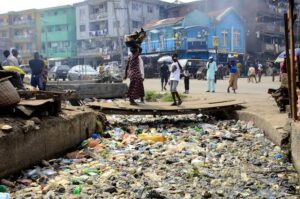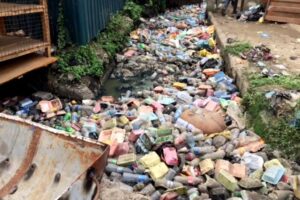By Mercy IyeneAbasi Etim
In January 2024, Lagos State took a bold step by banning the use of Styrofoam in government establishments and across the city. Despite initial skepticism, the ban’s impact has been significant. Canals once clogged with Styrofoam are now clearer, gutters flow more freely, and the overall cleanliness of the metropolis has improved.
This success has given the administration of Governor Babajide Sanwo-Olu the confidence to tackle an even bigger environmental challenge: banning single-use plastics like PET bottles and sachet water by January 2025. However, this initiative presents new hurdles.
Single-use plastics are ingrained in the daily lives of millions in Lagos. Sachet water, known as “pure water,” is a primary source of drinking water for many, and PET bottles are used extensively for beverages and other products. With over 60% of the city’s waste made up of plastic, tackling this issue requires a strategic and multifaceted approach.
The stakes are high, as plastic pollution is one of the leading contributors to Lagos’ environmental challenges, including clogged drainages, flooding, and marine pollution.
The success of the Styrofoam ban, however, proves that change is possible. The next step will require more than just a top-down policy. For this initiative to work, it must be implemented in phases to give businesses and consumers time to adapt. Phasing out single-use plastics gradually, starting with government institutions and public spaces, would set a precedent while avoiding major disruptions to daily life.
By starting with areas under direct government control, the administration can create early wins and a culture of compliance, which will encourage wider public participation.
Businesses – especially small and medium-sized enterprises (SMEs), are particularly concerned about the economic implications of this ban. Alternatives to single-use plastics, such as biodegradable materials or reusable containers, are often more expensive, and the cost of switching could affect both businesses and consumers. To mitigate this, the state government could offer incentives, such as tax breaks or grants, to companies that transition to eco-friendly packaging.
Encouraging local production of biodegradable materials would also create jobs and reduce reliance on imports.
Additionally, improving the city’s waste management infrastructure will be crucial. Lagos generates approximately 13,000 tonnes of waste per month, with plastics accounting for the majority of this. Expanding and modernizing the city’s recycling facilities would create a more sustainable solution for managing plastic waste. By formalizing the work of waste pickers and integrating them into the recycling sector, the government could both reduce landfill pressure and provide stable livelihoods for thousands of people.
Education and public awareness campaigns will be essential to the ban’s success. In the case of the Styrofoam ban, public buy-in was achieved through education on the harmful effects of plastic waste on health and the environment. Similarly, for single-use plastics, the government must engage schools, community centers, and religious institutions to inform Lagosians about the dangers of plastic pollution and the benefits of adopting sustainable practices. Ensuring that the public understands how their actions contribute to a cleaner environment is key to gaining widespread support.
Dialogue with stakeholders, particularly industry groups like the Association for Table Water Producers of Nigeria (ATWAP), will also be critical. ATWAP, representing over 2,000 members in Lagos, has expressed its willingness to cooperate but has requested a phased approach to ensure businesses have time to comply. Governor Sanwo-Olu’s administration would benefit from continued collaboration with industry leaders, ensuring that policies are realistic and consider the economic climate.
The government can also build on the momentum generated by international support for green initiatives. Recent projects, like the waste-to-energy programs receiving foreign investment, show that Lagos has the potential to be a leader in sustainable urban development. Leveraging such partnerships will provide the technical and financial resources needed to scale up waste management solutions and drive the single-use plastic ban forward.
Governor Babajide Sanwo-Olu has shown strong leadership on environmental issues, and with Commissioner for the Environment Tokunbo Wahab spearheading the new plastic waste policy, there is a real opportunity to address the growing plastic waste problem in Lagos. While there will undoubtedly be challenges, the phased rollout of the ban, investment in alternatives, and robust public engagement could make Lagos a trailblazer in sustainable waste management across Africa.
The success of the Styrofoam ban is already evident in areas like Oshodi, Mushin, and the Lekki-Epe corridor, where cleaner canals and drainage systems are visible. This should serve as a reminder that ambitious policies can work if properly implemented. As Lagos prepares for the 2025 deadline, the government must ensure it strikes a balance between environmental sustainability and economic viability, creating a future where the city is both prosperous and clean.

